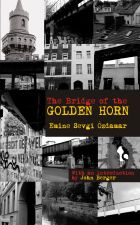Buy or gift a stand-alone digital subscription and get unlimited access to dozens of back issues for just £18.99 / $18.99 a year.
Please register at www.exacteditions.com/digital/cornucopia with your subscriber account number or contact subscriptions@cornucopia.net
Buy a digital subscription Go to the Digital EditionThe award-winning actress, director and author Emine Sevgi Özdamar’s semi-autobiographical masterpieces follow the life of an anonymous Turkish girl from birth to early adulthood. Her writing resonates with the many voices of Turkey’s people – from Anatolian villages and the dusty periphery of Ankara to student circles, Istanbul’s surrealist theatre and the factories of Germany. Life Is a Caravanserai follows a lively but unfortunate family from Istanbul to Bursa, on to Ankara and back to Istanbul. This is a woman’s world: Fatma, the mother, nurtures her three children with Ayşe, the grandmother, and the “aunties” of the neighbourhood, as Mustafa, the father, often jobless, recites Orhan Veli, drinks rakı and dreams of building a larger family home. Here is the Turkey of the 1950s and early 1960s, with its political struggles, growing urbanisation, the Korean War, American comic books and the departure of the first wave of workers to Germany. The Anatolian grandparents carry with them their sagas of the war and the nascent Turkish Republic, enriched by wisdom, humour and village folklore. The author’s wonderful use of local storytelling, proverbs and prayers, and a prose that moves from lyricism to gritty humour, re-creates this microcosm of neighbourhoods from a young girl’s intimate perspective. We follow her as she sits in school, visits relatives, dreams, listens to stories and experiments with early passions. Reality merges into mythological visions as, naïve, witty and explorative, she absorbs the colourful world around her. The first book leaves the girl, now a teenager, on an all-women train to West Berlin and work in a factory. The Bridge of the Golden Horn takes us into the marginal worlds of Turkish intellectuals and Germany’s urban working class. Never dull or predictable, and full of popular wisdom, this is far more than an autobiography. With its panoply of characters, it is an affectionate account of Turkey and Germany in the late 1960s, and a tribute to both the movement of people and the flow of ideas.
Famous for his atmospheric films set in stark landscapes, Nuri Bilge Ceylan is now attracting attention with his photography. Maureen Freely leafs through the pages of a fine limited-edition album of his enigmatic, painterly scenes
In September 2009, six travellers set out on horseback to retrace the early part of the route taken in 1671 by the Ottoman traveller Evliya Çelebi on his way to Mecca.
Spirited impressions of Ottoman Istanbul in the 16th century from a mischievous Danish artist and an acerbic Flemish envoy.
When eaten raw as a salad, turnips are shredded or thinly sliced like radishes. Their distinctive mustardy bite, which cleanses the palate, makes them excellent company for rich meats and fish. Cooking however, transforms the starch in the turnip, giving it a mellow taste.
More cookery features
The Great Mosque and Hospital of Divriği, an imperilled masterpiece of Islamic art in the remote upper Euphrates, is the only single building in Turkey given world heritage status. Cornucopia celebrates this medieval marvel with a 26-page guide to its mad, exuberant architecture through the stunning photographs of Cemal Emden
The city of Dresden is now home to one of the finest displays of Turkish art and armoury
Little known and rarely visited, the hauntingly beautiful sanctuary of Zeus at Labraunda – built by the family of the legendary Mausolus high above Milas – was for centuries Aegean Turkey’s most revered shrine. A Swedish team has managed to uncover the ruins without sacrificing the serenity of these sacred hills.
Daniel Shaffer explains the value of the Great Mosque of Divriği’s ancient carpets.
Reassuringly inaccessible, Divriği has always taken time to reach – and its riches time to savour. Patricia Daunt on the historical figures who made the journey


Cornucopia works in partnership with the digital publishing platform Exact Editions to offer individual and institutional subscribers unlimited access to a searchable archive of fascinating back issues and every newly published issue. The digital edition of Cornucopia is available cross-platform on web, iOS and Android and offers a comprehensive search function, allowing the title’s cultural content to be delved into at the touch of a button.
Digital Subscription: £18.99 / $18.99 (1 year)
Subscribe now